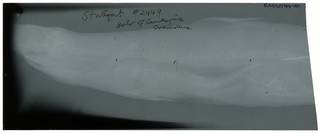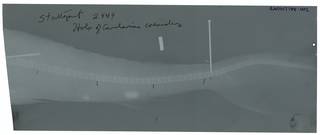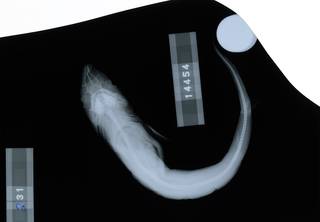WoRMS taxon details
Rhizoprionodon acutus (Rüppell, 1837)
105802 (urn:lsid:marinespecies.org:taxname:105802)
accepted
Species
Carcharhinus acutus (Rüppell, 1837) · unaccepted
Carcharias aaronis Hemprich & Ehrenberg, 1899 · unaccepted
Carcharias acutus Rüppell, 1837 · unaccepted
Carcharias crenidens Klunzinger, 1880 · unaccepted
Carcharias eumeces Pietschmann, 1913 · unaccepted
Carcharias sorrahkowah Bleeker, 1853 · unaccepted
Carcharias sorrakowah (Cuvier, 1829) · unaccepted
Carcharias walbeehmi Bleeker, 1856 · unaccepted
Carcharias walbeehmii (Bleeker, 1856) · unaccepted
Carcharias walbenii Bleeker, 1856 · unaccepted (misspelling)
Cynocephalus acutus (Rüppell, 1837) · unaccepted
Hypoprion acutus (Rüppell, 1837) · unaccepted
Scoliodon acutus (Rüppell, 1837) · unaccepted
Scoliodon longmani Ogilby, 1912 · unaccepted
Scoliodon palasorra (Bleeker, 1853) · unaccepted (misspelling)
Scoliodon palasorrah (Bleeker, 1853) · unaccepted
Scoliodon sorrahkowah (Bleeker, 1853) · unaccepted (misspelling)
Scoliodon vagatus Garman, 1913 · unaccepted
Scoliodon walbeehmi (Bleeker, 1856) · unaccepted
Scoliodon walbeehmii (Bleeker, 1856) · unaccepted
Scoliodon walbeemii (Bleeker, 1856) · unaccepted (misspelling)
Scolliodon walbechmii (Bleeker, 1856) · unaccepted (misspelling)
Squalus sorrakowah Cuvier, 1829 · unaccepted
marine, brackish, fresh, terrestrial
Not documented
Description Found on continental shelves, often on sandy beaches and rarely in estuaries. Can not tolerate very low salinities. Feeds...
Description Found on continental shelves, often on sandy beaches and rarely in estuaries. Can not tolerate very low salinities. Feeds mainly on bony fishes but also takes cephalopods and other invertebrates. Viviparous, with 1 to 8 in a litter. Size at birth between 25 and 39 cm. Quite common. Often taken by anglers (Ref. 5485). Utilized for human consumption and processed for fishmeal. [details]
Froese, R. and D. Pauly. Editors. (2024). FishBase. Rhizoprionodon acutus (Rüppell, 1837). Accessed through: World Register of Marine Species at: https://www.marinespecies.org/aphia.php?p=taxdetails&id=105802 on 2024-04-23
Date
action
by
![]() The webpage text is licensed under a Creative Commons Attribution-Noncommercial 4.0 License
The webpage text is licensed under a Creative Commons Attribution-Noncommercial 4.0 License
context source (Deepsea)
Intergovernmental Oceanographic Commission (IOC) of UNESCO. The Ocean Biogeographic Information System (OBIS), available online at http://www.iobis.org/ [details]
context source (HKRMS) Hong Kong marine fish database. <em>AFCD.</em> , available online at https://www.hk-fish.net/en/fish/introduction/ [details]
basis of record van der Land, J.; Costello, M.J.; Zavodnik, D.; Santos, R.S.; Porteiro, F.M.; Bailly, N.; Eschmeyer, W.N.; Froese, R. (2001). Pisces, <B><I>in</I></B>: Costello, M.J. <i>et al.</i> (Ed.) (2001). <i>European register of marine species: a check-list of the marine species in Europe and a bibliography of guides to their identification. Collection Patrimoines Naturels,</i> 50: pp. 357-374 (look up in IMIS) [details]
additional source Streftaris, N., A. Zenetos & E. Papathanassiou. (2005). Globalisation in marine ecosystems: the story of non-indigenous marine species across European seas. <em>Oceanogry and Marine Biology: an Annual Review.</em> 43: 419-453. (look up in IMIS) [details] Available for editors [request]
[request]
additional source Zenetos, A.; Çinar, M.E.; Pancucci-Papadopoulou, M.A.; Harmelin, J.-G.; Furnari, G.; Andaloro, F.; Bellou, N.; Streftaris, N.; Zibrowius, H. (2005). Annotated list of marine alien species in the Mediterranean with records of the worst invasive species. <em>Mediterranean Marine Science.</em> 6 (2): 63-118., available online at https://www.researchgate.net/publication/273213810_Annotated_list_of_marine_alien_species_in_the_Mediterranean_with_records_of_the_worst_invasive_species [details] Available for editors [request]
[request]
additional source Liu, J.Y. [Ruiyu] (ed.). (2008). Checklist of marine biota of China seas. <em>China Science Press.</em> 1267 pp. (look up in IMIS) [details] Available for editors [request]
[request]
additional source Zenetos, A.; Gofas, S.; Verlaque, M.; Cinar, M.; Garcia Raso, J.; Bianchi, C.; Morri, C.; Azzurro, E.; Bilecenoglu, M.; Froglia, C.; Siokou, I.; Violanti, D.; Sfriso, A.; San Martin, G.; Giangrande, A.; Katagan, T.; Ballesteros, E.; Ramos-Espla, A.; Mastrototaro, F.; Ocana, O.; Zingone, A.; Gambi, M.; Streftaris, N. (2010). Alien species in the Mediterranean Sea by 2010. A contribution to the application of European Union's Marine Strategy Framework Directive (MSFD). Part I. Spatial distribution. <em>Mediterranean Marine Science.</em> 11(2): 381-493., available online at https://doi.org/10.12681/mms.87 [details]
additional source Ben Rais Lasram, F.; Mouillot, D. (2008). Increasing southern invasion enhances congruence between endemic and exotic Mediterranean fish fauna. <em>Biological Invasions.</em> 11(3): 697-711., available online at https://doi.org/10.1007/s10530-008-9284-4 [details] Available for editors [request]
[request]
additional source Froese, R. & D. Pauly (Editors). (2023). FishBase. World Wide Web electronic publication. version (02/2023)., available online at https://www.fishbase.org [details]
context source (HKRMS) Hong Kong marine fish database. <em>AFCD.</em> , available online at https://www.hk-fish.net/en/fish/introduction/ [details]
basis of record van der Land, J.; Costello, M.J.; Zavodnik, D.; Santos, R.S.; Porteiro, F.M.; Bailly, N.; Eschmeyer, W.N.; Froese, R. (2001). Pisces, <B><I>in</I></B>: Costello, M.J. <i>et al.</i> (Ed.) (2001). <i>European register of marine species: a check-list of the marine species in Europe and a bibliography of guides to their identification. Collection Patrimoines Naturels,</i> 50: pp. 357-374 (look up in IMIS) [details]
additional source Streftaris, N., A. Zenetos & E. Papathanassiou. (2005). Globalisation in marine ecosystems: the story of non-indigenous marine species across European seas. <em>Oceanogry and Marine Biology: an Annual Review.</em> 43: 419-453. (look up in IMIS) [details] Available for editors
additional source Zenetos, A.; Çinar, M.E.; Pancucci-Papadopoulou, M.A.; Harmelin, J.-G.; Furnari, G.; Andaloro, F.; Bellou, N.; Streftaris, N.; Zibrowius, H. (2005). Annotated list of marine alien species in the Mediterranean with records of the worst invasive species. <em>Mediterranean Marine Science.</em> 6 (2): 63-118., available online at https://www.researchgate.net/publication/273213810_Annotated_list_of_marine_alien_species_in_the_Mediterranean_with_records_of_the_worst_invasive_species [details] Available for editors
additional source Liu, J.Y. [Ruiyu] (ed.). (2008). Checklist of marine biota of China seas. <em>China Science Press.</em> 1267 pp. (look up in IMIS) [details] Available for editors
additional source Zenetos, A.; Gofas, S.; Verlaque, M.; Cinar, M.; Garcia Raso, J.; Bianchi, C.; Morri, C.; Azzurro, E.; Bilecenoglu, M.; Froglia, C.; Siokou, I.; Violanti, D.; Sfriso, A.; San Martin, G.; Giangrande, A.; Katagan, T.; Ballesteros, E.; Ramos-Espla, A.; Mastrototaro, F.; Ocana, O.; Zingone, A.; Gambi, M.; Streftaris, N. (2010). Alien species in the Mediterranean Sea by 2010. A contribution to the application of European Union's Marine Strategy Framework Directive (MSFD). Part I. Spatial distribution. <em>Mediterranean Marine Science.</em> 11(2): 381-493., available online at https://doi.org/10.12681/mms.87 [details]
additional source Ben Rais Lasram, F.; Mouillot, D. (2008). Increasing southern invasion enhances congruence between endemic and exotic Mediterranean fish fauna. <em>Biological Invasions.</em> 11(3): 697-711., available online at https://doi.org/10.1007/s10530-008-9284-4 [details] Available for editors
additional source Froese, R. & D. Pauly (Editors). (2023). FishBase. World Wide Web electronic publication. version (02/2023)., available online at https://www.fishbase.org [details]
 Present
Present  Present in aphia/obis/gbif/idigbio
Present in aphia/obis/gbif/idigbio  Inaccurate
Inaccurate  Introduced: alien
Introduced: alien  Containing type locality
Containing type locality
From other sources
Description Found on continental shelves, often on sandy beaches and rarely in estuaries. Can not tolerate very low salinities. Feeds mainly on bony fishes but also takes cephalopods and other invertebrates. Viviparous, with 1 to 8 in a litter. Size at birth between 25 and 39 cm. Quite common. Often taken by anglers (Ref. 5485). Utilized for human consumption and processed for fishmeal. [details]
| Language | Name | |
|---|---|---|
| English | milk shark | [details] |
| German | Milchhai | [details] |
| Japanese | ヒラガシラ | [details] |
| Lithuanian | ilgažiomenis ryklys | [details] |
| Modern Greek (1453-) | Πριονοδοντοκαρχαρίας | [details] |
| Russian | остроносая длиннорылая акуламолочная акулаакула вальбема | [details] |
| Spanish | tiburón lechoso | [details] |
| Turkish | çekic başlı köpekbalığı | [details] |
| Ukrainian | молочна акула Акула молочна | [details] |
To Barcode of Life (216 barcodes)
To Biodiversity Heritage Library (1 publication) (from synonym Carcharias aaronis Hemprich & Ehrenberg, 1899)
To Biodiversity Heritage Library (1 publication) (from synonym Carcharias walbeehmi Bleeker, 1856)
To Biodiversity Heritage Library (1 publication) (from synonym Cynocephalus acutus (Rüppell, 1837))
To Biodiversity Heritage Library (1 publication) (from synonym Scoliodon palasorra (Bleeker, 1853))
To Biodiversity Heritage Library (1 publication) (from synonym Scolliodon walbechmii (Bleeker, 1856))
To Biodiversity Heritage Library (11 publications) (from synonym Scoliodon palasorrah (Bleeker, 1853))
To Biodiversity Heritage Library (11 publications)
To Biodiversity Heritage Library (13 publications) (from synonym Scoliodon walbeehmi (Bleeker, 1856))
To Biodiversity Heritage Library (28 publications) (from synonym Scoliodon acutus (Rüppell, 1837))
To Biodiversity Heritage Library (3 publications) (from synonym Scoliodon longmani Ogilby, 1912)
To Biodiversity Heritage Library (4 publications) (from synonym Scoliodon walbeehmii (Bleeker, 1856))
To Biodiversity Heritage Library (4 publications) (from synonym Scoliodon vagatus Garman, 1913)
To Biodiversity Heritage Library (4 publications) (from synonym Carcharias sorrakowah (Cuvier, 1829))
To Biodiversity Heritage Library (5 publications) (from synonym Carcharias eumeces Pietschmann, 1913)
To Biodiversity Heritage Library (5 publications) (from synonym Carcharias walbeehmii (Bleeker, 1856))
To Biodiversity Heritage Library (60 publications) (from synonym Carcharias acutus Rüppell, 1837)
To Biodiversity Heritage Library (7 publications) (from synonym Carcharias crenidens Klunzinger, 1880)
To Biological Information System for Marine Life (BISMaL) (from synonym Carcharias acutus Rüppell, 1837)
To Biological Information System for Marine Life (BISMaL)
To European Nucleotide Archive (ENA)
To FishBase
To FishBase (from synonym Carcharhinus acutus (Rüppell, 1837))
To FishBase (from synonym Carcharias aaronis Hemprich & Ehrenberg, 1899)
To FishBase (from synonym Scoliodon vagatus Garman, 1913)
To FishBase (from synonym Carcharias acutus Rüppell, 1837)
To FishBase (from synonym Scoliodon walbeehmi (Bleeker, 1856))
To FishBase (from synonym Carcharias crenidens Klunzinger, 1880)
To FishBase (from synonym Carcharias eumeces Pietschmann, 1913)
To FishBase (from synonym Carcharias walbeehmi Bleeker, 1856)
To FishBase (from synonym Scoliodon acutus (Rüppell, 1837))
To FishBase (from synonym Carcharias sorrahkowah Bleeker, 1853)
To FishBase (from synonym Carcharias walbeehmii (Bleeker, 1856))
To FishBase (from synonym Scoliodon walbeehmii (Bleeker, 1856))
To FishBase (from synonym Scoliodon longmani Ogilby, 1912)
To FishBase (from synonym Cynocephalus acutus (Rüppell, 1837))
To FishBase (from synonym Hypoprion acutus (Rüppell, 1837))
To FishBase (from synonym Scoliodon palasorra (Bleeker, 1853))
To FishBase (from synonym Carcharias walbenii Bleeker, 1856)
To FishBase (from synonym Scoliodon walbeemii (Bleeker, 1856))
To Fishbase (from synonym Squalus sorrakowah Cuvier, 1829)
To FishBase (from synonym Scoliodon sorrahkowah (Bleeker, 1853))
To FishBase (from synonym Scoliodon palasorrah (Bleeker, 1853))
To FishBase (from synonym Scolliodon walbechmii (Bleeker, 1856))
To FishBase images (Rhizoprionodon acutus, Cape Verde, by Cambraia Duarte, P.M.N. (c)ImagDOP)
To GenBank (261 nucleotides; 256 proteins)
To GenBank (261 nucleotides; 256 proteins) (from synonym Carcharias acutus Rüppell, 1837)
To GenBank (261 nucleotides; 256 proteins) (from synonym Scoliodon walbeemii (Bleeker, 1856))
To Global Biotic Interactions (GloBI)
To IUCN Red List (Vulnerable)
To NMNH Extant Collection (Carcharhinidae RAD110063 thru RAD110064 Envelope)
To NMNH Extant Collection (Carcharias (Scoliodon) walbeehmi RAD109609-001) (from synonym Carcharias walbeehmi Bleeker, 1856)
To NMNH Extant Collection (Carcharias acutus RAD107178-001) (from synonym Carcharias acutus Rüppell, 1837)
To NMNH Extant Collection (Carcharias crenidens RAD107188-001) (from synonym Carcharias crenidens Klunzinger, 1880)
To NMNH Extant Collection (Carcharias eumeces RAD107183-001) (from synonym Carcharias eumeces Pietschmann, 1913)
To PESI
To ITIS
To Biodiversity Heritage Library (1 publication) (from synonym Carcharias aaronis Hemprich & Ehrenberg, 1899)
To Biodiversity Heritage Library (1 publication) (from synonym Carcharias walbeehmi Bleeker, 1856)
To Biodiversity Heritage Library (1 publication) (from synonym Cynocephalus acutus (Rüppell, 1837))
To Biodiversity Heritage Library (1 publication) (from synonym Scoliodon palasorra (Bleeker, 1853))
To Biodiversity Heritage Library (1 publication) (from synonym Scolliodon walbechmii (Bleeker, 1856))
To Biodiversity Heritage Library (11 publications) (from synonym Scoliodon palasorrah (Bleeker, 1853))
To Biodiversity Heritage Library (11 publications)
To Biodiversity Heritage Library (13 publications) (from synonym Scoliodon walbeehmi (Bleeker, 1856))
To Biodiversity Heritage Library (28 publications) (from synonym Scoliodon acutus (Rüppell, 1837))
To Biodiversity Heritage Library (3 publications) (from synonym Scoliodon longmani Ogilby, 1912)
To Biodiversity Heritage Library (4 publications) (from synonym Scoliodon walbeehmii (Bleeker, 1856))
To Biodiversity Heritage Library (4 publications) (from synonym Scoliodon vagatus Garman, 1913)
To Biodiversity Heritage Library (4 publications) (from synonym Carcharias sorrakowah (Cuvier, 1829))
To Biodiversity Heritage Library (5 publications) (from synonym Carcharias eumeces Pietschmann, 1913)
To Biodiversity Heritage Library (5 publications) (from synonym Carcharias walbeehmii (Bleeker, 1856))
To Biodiversity Heritage Library (60 publications) (from synonym Carcharias acutus Rüppell, 1837)
To Biodiversity Heritage Library (7 publications) (from synonym Carcharias crenidens Klunzinger, 1880)
To Biological Information System for Marine Life (BISMaL) (from synonym Carcharias acutus Rüppell, 1837)
To Biological Information System for Marine Life (BISMaL)
To European Nucleotide Archive (ENA)
To FishBase
To FishBase (from synonym Carcharhinus acutus (Rüppell, 1837))
To FishBase (from synonym Carcharias aaronis Hemprich & Ehrenberg, 1899)
To FishBase (from synonym Scoliodon vagatus Garman, 1913)
To FishBase (from synonym Carcharias acutus Rüppell, 1837)
To FishBase (from synonym Scoliodon walbeehmi (Bleeker, 1856))
To FishBase (from synonym Carcharias crenidens Klunzinger, 1880)
To FishBase (from synonym Carcharias eumeces Pietschmann, 1913)
To FishBase (from synonym Carcharias walbeehmi Bleeker, 1856)
To FishBase (from synonym Scoliodon acutus (Rüppell, 1837))
To FishBase (from synonym Carcharias sorrahkowah Bleeker, 1853)
To FishBase (from synonym Carcharias walbeehmii (Bleeker, 1856))
To FishBase (from synonym Scoliodon walbeehmii (Bleeker, 1856))
To FishBase (from synonym Scoliodon longmani Ogilby, 1912)
To FishBase (from synonym Cynocephalus acutus (Rüppell, 1837))
To FishBase (from synonym Hypoprion acutus (Rüppell, 1837))
To FishBase (from synonym Scoliodon palasorra (Bleeker, 1853))
To FishBase (from synonym Carcharias walbenii Bleeker, 1856)
To FishBase (from synonym Scoliodon walbeemii (Bleeker, 1856))
To Fishbase (from synonym Squalus sorrakowah Cuvier, 1829)
To FishBase (from synonym Scoliodon sorrahkowah (Bleeker, 1853))
To FishBase (from synonym Scoliodon palasorrah (Bleeker, 1853))
To FishBase (from synonym Scolliodon walbechmii (Bleeker, 1856))
To FishBase images (Rhizoprionodon acutus, Cape Verde, by Cambraia Duarte, P.M.N. (c)ImagDOP)
To GenBank (261 nucleotides; 256 proteins)
To GenBank (261 nucleotides; 256 proteins) (from synonym Carcharias acutus Rüppell, 1837)
To GenBank (261 nucleotides; 256 proteins) (from synonym Scoliodon walbeemii (Bleeker, 1856))
To Global Biotic Interactions (GloBI)
To IUCN Red List (Vulnerable)
To NMNH Extant Collection (Carcharhinidae RAD110063 thru RAD110064 Envelope)
To NMNH Extant Collection (Carcharias (Scoliodon) walbeehmi RAD109609-001) (from synonym Carcharias walbeehmi Bleeker, 1856)
To NMNH Extant Collection (Carcharias acutus RAD107178-001) (from synonym Carcharias acutus Rüppell, 1837)
To NMNH Extant Collection (Carcharias crenidens RAD107188-001) (from synonym Carcharias crenidens Klunzinger, 1880)
To NMNH Extant Collection (Carcharias eumeces RAD107183-001) (from synonym Carcharias eumeces Pietschmann, 1913)
To PESI
To ITIS







